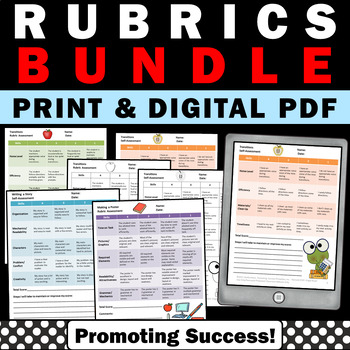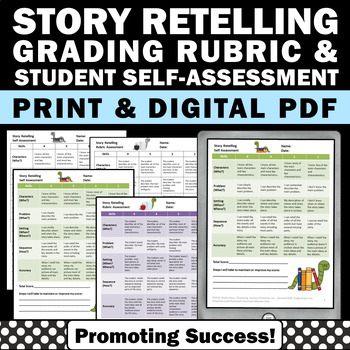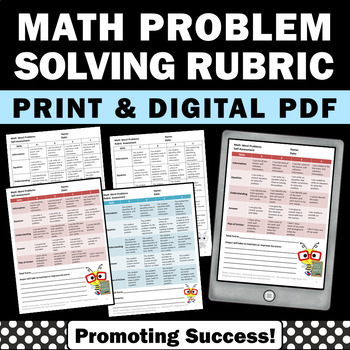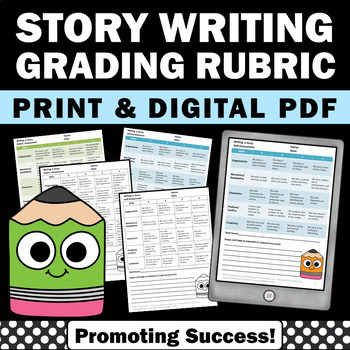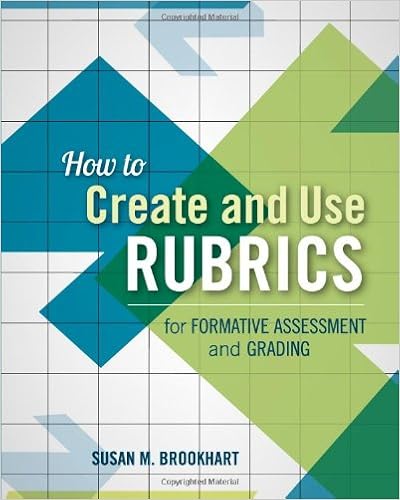Click HERE to SUBSCRIBE to our V.I.P. exclusive newsletter for SECRET SALES and FREE printables.
Note: This blog post contains resources from our TpT store and our Amazon Associate store.
Do you use rubrics as assessment tools?
Do they enhance student performance?
Do they consume more time?
Are they worth it?
Why use them?
What is a grading rubric?
A rubric is a coherent set of criteria for students' work that includes descriptions of levels of performance quality on the criteria.
Here are my top 10 reasons why (and how) teachers should use rubrics in their classroom assessments:
1. Rubrics can be created to align with common core standards while assessing skills on a continuum.
2. By examining the targeted skills with the student prior to the task, the student has clear expectations prior to and during the task. Yes, students should be given the rubric BEFORE the task is assigned. Would you want your supervisor to give you a task, you complete it, and then you see the evaluation criteria? Nope.
3. Teachers and students can set targeted goals in relation to skills rather than grades or percentages.
4. Communication with parents is enhanced. A rubric assessment tells why a student received a specified letter grade in terms of skill acquisition.
5. Self assessments help student’s take ownership in their own learning and increases motivation and achievement.
6. Precise feedback can be given with clear direction on how to improve performance.
7. Students can examine their own performance and make adjustments prior to submitting work. (Once again, the student must have the rubric prior to completing the task!) We want self-directed life long learners!
8. Progress on specific skills can easily be monitored over a period of time with consistency.
9. Grading becomes less subjective with clearly defined skill objectives. Bias is minimized.
10. Assessment time is reduced while consistency and effectiveness is increased.
The key to the success of any rubric assessment tool is to have clear expectations for the students by teaching and sharing the rubric prior to assigning the task.
NOTE: Not all rubrics are successful. Rubrics must be shown to the students BEFORE completing the task. Also, rubrics must be written in OBJECTIVE, MEASURABLE terms. Subjective, unclear rubrics are not effective.
Here is a sample rubric outcome, "Student will demonstrate understanding of the concept."
This is not a clear and measurable outcome. HOW will the student demonstrate understanding? What do you mean by "understanding"?
This outcome would be better defined:
3 Points: Student writes three facts about the constitution.
2 Points: Student writes two facts about the constitution.
1 Point: Student writes one fact about the constitution.
0 Points: Student is unable to write one fact about the constitution.
Click HERE to read an article from Edutopia about clear expectations.
------------------------
You may like these rubrics from our TpT store:
This packet contains a bundled set of 10 of grading assessments for math, literacy, science, social studies and special education. You will receive 22 total scoring rubrics including teacher rubrics and student self-assessments.
---------------------------------------------
You may also like these resources from our Amazon Associate store:
---------------------------------------------
---------------------------------------------
---------------------------------------------
Click HERE to SUBSCRIBE to our newsletter for SECRET SALES and FREE printables.
Click HERE to follow us on Instagram.
Click HERE to follow us on Pinterest.
Shelly Anton is a participant in the Amazon Services LLC Associates Program, an affiliate advertising program designed to provide a means for sites to earn advertising fees by advertising and linking to Amazon.com. ** This means there are Amazon affiliate links in these blog posts. This does not mean you pay a dime more when you purchase a product through the link. It just means I am trying to save you valuable teacher time by making it easier for you to find great resources for your students, and I earn a few cents for my research and time. Thank you for all you do for kids!



